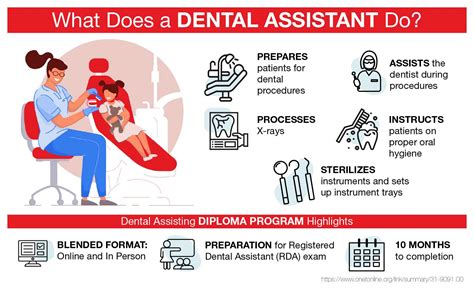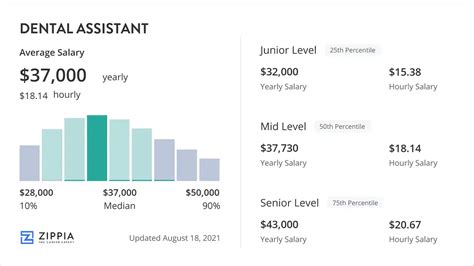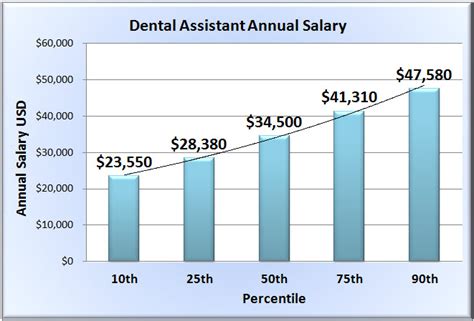Considering a career as a dental assistant? It's a rewarding path that places you at the heart of patient care, blending clinical skill with interpersonal connection. But beyond job satisfaction, it’s crucial to understand the financial potential. A dental assistant's salary is not just a single number; it's a dynamic figure influenced by your skills, location, and career choices.
According to the U.S. Bureau of Labor Statistics (BLS), the median annual salary for dental assistants was $46,540 in May 2023. However, top earners in the field command salaries well over $62,000. This guide will break down what you can expect to earn and, more importantly, how you can maximize your income in this growing profession.
What Does a Dental Assistant Do?

Before diving into the numbers, let's briefly recap the role. A dental assistant is a vital member of the dental care team, working alongside dentists and hygienists to ensure a smooth and effective patient experience. Their responsibilities are diverse and demanding, often including:
- Chairside Assisting: Passing instruments to the dentist, using the suction hose, and anticipating the needs of the procedure.
- Patient Care: Preparing patients for treatment, ensuring their comfort, and providing post-operative instructions.
- Infection Control: Sterilizing instruments and preparing treatment rooms according to strict health and safety protocols.
- Dental Radiography: Taking and developing dental X-rays (requires proper certification).
- Office & Lab Duties: Scheduling appointments, managing patient records, and creating temporary crowns or taking impressions.
Their work is essential for the efficiency and safety of any dental practice.
Average Dental Assistant Salary

When analyzing salary data, it's best to look at multiple authoritative sources to get a complete picture.
The most reliable benchmark comes from the U.S. Bureau of Labor Statistics (BLS), which reported the following for May 2023:
- Median Annual Salary: $46,540
- Median Hourly Wage: $22.38
- Salary Range: The lowest 10% of earners made less than $35,530, while the highest 10% earned more than $62,560.
This range highlights the significant impact of the factors we will discuss below. Entry-level positions will naturally start at the lower end, while experienced, certified assistants in high-demand areas will earn at the top of the scale.
Other reputable salary aggregators provide similar real-time data:
- Salary.com places the average dental assistant salary in the U.S. between $42,669 and $54,163 as of early 2024.
- Payscale reports a similar average base salary and notes that bonuses and profit-sharing can add to the total compensation package.
Key Factors That Influence Salary

Your earning potential is not set in stone. Several key factors can significantly increase your salary. Understanding them is the first step toward strategically building your career and your income.
###
Level of Education & Certification
While some states allow for on-the-job training, formal education and professional certification are the most direct paths to a higher salary.
- Formal Training: Graduating from a one-year certificate or diploma program, or a two-year associate degree program accredited by the Commission on Dental Accreditation (CODA), provides a strong foundation that employers value and reward.
- National Certification: The Dental Assisting National Board (DANB) offers the prestigious Certified Dental Assistant (CDA) credential. According to a DANB salary survey, assistants holding a CDA certification earn, on average, over $2.00 more per hour than their non-certified counterparts. Certification demonstrates a commitment to the profession and a mastery of core competencies.
- State-Specific Permits: Many states require specific permits or licenses to perform certain tasks, especially radiography (taking X-rays). Having these qualifications is often a prerequisite for employment and can provide a salary edge.
###
Years of Experience
Experience is a powerful driver of salary growth. As you build your skills and prove your reliability, your value to a practice increases.
- Entry-Level (0-2 Years): Assistants in their first couple of years are typically learning the ropes and will earn a salary at the lower end of the national range, generally between $36,000 and $42,000.
- Mid-Career (3-9 Years): With several years of experience, assistants are proficient, efficient, and can handle a wider range of tasks with minimal supervision. Their salaries often align with or exceed the national median ($45,000 - $52,000).
- Experienced/Senior (10+ Years): Highly experienced assistants, especially those who take on leadership roles like office management or lead assistant, can command salaries at the top of the spectrum, often exceeding $55,000 and reaching into the low $60,000s.
###
Geographic Location
Where you work matters—a lot. Salaries vary significantly between states and even between metropolitan and rural areas, largely due to differences in cost of living and local demand for dental services.
According to the BLS, the top-paying states for dental assistants are:
1. Minnesota: $61,540 (Average Annual Salary)
2. Alaska: $57,210
3. New Hampshire: $56,760
4. Oregon: $56,330
5. Massachusetts: $55,910
Conversely, states with a lower cost of living may offer salaries below the national median. It's always wise to research the average salary for your specific city or state when evaluating job offers.
###
Company Type (Work Setting)
The type of practice you work in also influences your paycheck.
- General Dentistry: This is the most common work setting. Salaries here often reflect the national average.
- Specialty Offices: Practices focused on orthodontics, oral and maxillofacial surgery, periodontics, or endodontics often pay higher salaries. These roles require specialized knowledge and skills, making the assistants more valuable.
- Government and Hospitals: According to the BLS, dental assistants working in government facilities (like veterans' hospitals) or state-owned hospitals tend to have the highest average salaries.
- Dental Support Organizations (DSOs): Large corporate dental groups may offer competitive salaries and benefits packages, sometimes with opportunities for advancement within a larger organizational structure.
###
Area of Specialization (Expanded Functions)
One of the most effective ways to boost your salary is by acquiring advanced skills, particularly those that fall under the umbrella of Expanded Functions Dental Assistant (EFDA). EFDA regulations vary by state, but these assistants are permitted to perform a wider range of intraoral tasks, such as:
- Placing and carving fillings
- Applying sealants and fluoride
- Coronal polishing
- Placing temporary crowns
Because EFDAs can perform more complex, reversible procedures, they significantly increase a dentist's productivity. This added value translates directly into higher pay, with EFDAs often earning 15-25% more than assistants without these advanced skills.
Job Outlook

The future for dental assistants is incredibly bright. The BLS projects that employment for dental assistants will grow by 7% from 2022 to 2032, which is much faster than the average for all occupations.
This robust growth is driven by several factors:
- Ongoing research linking oral health to general health is increasing demand for preventative dental care.
- The large, aging baby-boomer population is retaining more teeth, requiring more maintenance and care.
- As dentists' schedules become busier, they are expected to delegate more routine tasks to assistants, especially those with expanded function certifications.
This high demand ensures strong job security and continued opportunities for career and salary growth in the years to come.
Conclusion

A career as a dental assistant offers a stable, in-demand, and rewarding professional path with a solid salary. While the national median provides a useful benchmark, your individual earning potential is largely in your hands.
To maximize your salary, focus on these key takeaways:
- Invest in Education: Formal training and, most importantly, DANB certification (CDA) are proven ways to increase your hourly wage.
- Embrace Specialization: Pursue Expanded Functions (EFDA) training if available in your state. It is one of the fastest routes to a significant pay increase.
- Gain Experience: Stay committed to the profession to build the experience that employers value and reward.
- Be Strategic: Research salaries in your geographic area and consider working in specialty practices to command a higher income.
By being proactive about your skills and career choices, you can build a financially successful and professionally fulfilling career as a dental assistant.
